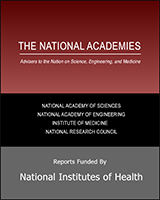NCBI Bookshelf. A service of the National Library of Medicine, National Institutes of Health.
Institute of Medicine (US) Forum on Microbial Threats. Addressing Foodborne Threats to Health: Policies, Practices, and Global Coordination: Workshop Summary. Washington (DC): National Academies Press (US); 2006.

Addressing Foodborne Threats to Health: Policies, Practices, and Global Coordination: Workshop Summary.
Show detailsBoard on Global Health
Institute of Medicine
The National Academies
Foodborne Threats to Health: The Practice and Policies of Surveillance, Prevention, Outbreak Investigations, and International Coordination
October 25 and 26, 2005
KECK 100
National Academies
500 Fifth Street, N.W.
Washington, D.C. 20001
AGENDA
Tuesday, October 25, 2005
| 8:30–9:00: | Continental Breakfast |
| 9:00: | Welcome and Opening Remarks |
| Stanley Lemon, The University of Texas Medical Branch, Galveston | |
| Chair, Forum on Microbial Threats | |
| Margaret A. (Peggy) Hamburg, Nuclear Threat Initiative Vice-chair, Forum on Microbial Threats |
Session I. The Current U.S. Food Supply—Ruth Berkelman, Moderator
| 9:20: | Globalization of the food supply—Discussion to address the “inputs” to the U.S. food supply—locally, regionally, and globally—and how the percentage of those inputs has changed over time.
|
| 9:50: | Discussion |
| 10:15: | Break |
Session II. The Food Supply “Threat Spectrum”—Michael Osterholm, Moderator
| 9:00: | Welcome and Opening Remarks |
| 10:30: | Overview of the threat spectrum—Unintentional vs. intentional
|
| 11:00: | Discussion |
| 11:15: | Burden of illness associated with foodborne threats to health
|
| 11:45: | Discussion |
| 12:00–12:45: | Lunch |
Session III. The Food Supply “Threat Spectrum”: Case Studies—David Acheson, Moderator
| 12:45: | Cyclosporiasis in imported fresh basil
|
| 1:15: | Hepatitis A from imported green onions
|
| 1:45–2:15: | Discussion |
| 2:15–2:30: | Break |
| 2:30–3:30: | Botulinum toxin—David Acheson, presenter |
Discussants:
| |
| 3:30–3:50: | Discussion |
Session IV. What are the Tools and Technologies for Real-Time Surveillance of the Food Supply for Conventional and Unconventional Adulterants? Local/Regional/National/Global—Dr. Pat Fitch, Moderator
| 3:50–5:00: | |
| |
| 5:00–5:45: | |
| Open Discussion of Day 1/Adjournment of the first day | |
| 6:00: | Reception |
| 7:15: | Dinner Meeting of the Forum on Microbial Threats [location: The Atrium, 3rd Floor; KECK Center] |
Wednesday, October 26, 2005
| 8:00–8:30: | Continental Breakfast |
| 8:30: | Opening Remarks/Summary of Day 1 |
| P. Frederick Sparling, UNC, Vice-chair, Forum on Microbial Threats |
Session V. Who Is Responsible for Ensuring the Wholesomeness of the Food Supply? Domestic and International Perspectives—Dr. Jim Hughes, Moderator
| 8:45: | The U.S. Food Safety System
|
| 9:15: | The International Food Safety System—WHO perspective
|
| 9:45: | Discussion |
| 10:15–10:30: | Break |
Session VI. What Are the Incentives and Disincentives Associated with Disease/Contamination Reporting? Impacts on Human Health and International Trade—BSE as a “Case Study”—Dr. Lonnie King, Moderator
| 10:30–12:00: | Case study of BSE—Human illness associated with BSE-tainted meat and meat products; surveillance tools and technologies; impacts on international trade associated with reporting a “positive” |
Overview: Stanley Prusiner, UC San Francisco
| |
| 12:00–12:15: | Discussion |
| 12:15–12:45: | Discussion of Morning Sessions |
| 12:45–1:30: | Lunch |
Session VII. Threat Reduction Research and Policy Opportunities—Dr. George Korch, Moderator
| 1:30–2:45: | Panelists
|
| 2:45–3:15: | Discussion |
| 3:15–4:00: | Next Steps |
| 4:15: | Adjourn |
- Forum on Microbial Threats - Addressing Foodborne Threats to HealthForum on Microbial Threats - Addressing Foodborne Threats to Health
- ctxn2 [Astyanax mexicanus]ctxn2 [Astyanax mexicanus]Gene ID:111197557Gene
Your browsing activity is empty.
Activity recording is turned off.
See more...